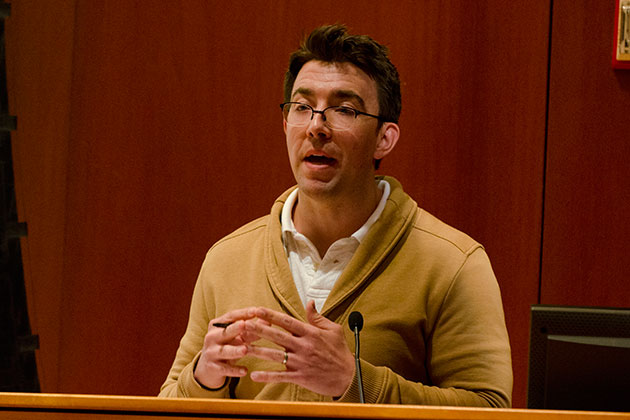
As an undergraduate, Jordan Kiper traveled independently throughout the southeastern part of Europe, known as the Balkans, to study the various dialects of Serbo-Croatian and how language usage was changing in the region. While visiting Bosnia and Serbia, he saw evidence of the Yugoslav Wars and the toll they had taken on the people who lived there.
“Everywhere I went the effects of the war were apparent,” says Kiper, now a doctoral student in anthropology at UConn, who is focusing his dissertation on the effects of war propaganda on combatants of campaigns involving human rights violations, particularly in Serbia. “There were bullets in walls and several buildings were still destroyed. I would go to Bosnia and neighboring areas, and the people seemed so similar; I would wonder why neighbors would do this to one another.”
Kiper, who came to UConn from Colorado University in 2009, is among the graduate students who participated in the 10th Human Rights Institute Conference: Contexts of Human Rights, held this week at the Thomas J. Dodd Research Center. Graduate students from various disciplines met during the conference to discuss their research interests and share ideas before participating in the conference, which featured noted human rights experts from around the world, including UConn faculty.
“I came to UConn particularly because the programs allowed me to create a niche for myself for the type of research I want to do,” Kiper says. “I’m in anthropology, but also completing graduate certificates in human rights, quantitative methodologies, and cognitive science, all of which allow me to work on the evolution of morality and religion, which is my main interest.”
Morality and religion
Kiper is studying the function of religious and moral systems within particular environments. He is looking specifically at how religion and morality might have evolved throughout human evolution; what influences moral behavior; and the development of religion and morality across a person’s lifespan. He is focusing his doctoral research on how war propaganda and other cultural influences affected combatants during the Yugoslav Wars in the decade of the 1990s, which resulted in 130,000 deaths, including war crimes such as mass murder and genocide that are the subject of criminal prosecutions pursued by the International Criminal Tribunal convened by the United Nations. As part of his work, Kiper is interviewing Serbian veterans of the war.
“Religion is a system that fits in within culture and works in groups; it can have positive or negative outcomes,” Kiper says. “For a while there was this belief in the humanities during the late 19th and early 20th century – namely within positivism – that religion wasn’t very important; that it would dissolve and we’d move toward an entirely secular system. That hasn’t happened. Religion still seems to be a driver for all communities, for better or worse. Regardless, it’s hard to divorce morality from religion. That’s what led me to look at morality and religion together.”
Kiper says his research is starting to show that certain types of environments in which perpetrators of violence find themselves will produce different levels of violence, and that religion is “very important” in deterring violence. Concerning the influence of war propaganda, his conversations with Serbian war veterans are revealing that combatants were not exposed to as much war propaganda as international courts presume. Rather, many soldiers saw themselves as being part of a “culture of heroism,” in which previous generations in their family fought in earlier Balkan wars, and their perspectives about the wars originated from the view of defending their homeland and religion.
At the same time, spending time on the front line produced a cognitive dissonance about the truth of what was happening in the war, and soldiers had to rationalize their violent behavior. For example, stories such as massacres of children or torture by the enemy were circulated among soldiers at the battlefront, which in many cases could not be confirmed but were nevertheless conveyed to journalists and reported as truths to larger audiences.
In this way, it appears that a cycle of war propaganda in the Yugoslav Wars began with rumors about the “enemy” among soldiers, which were passed on to journalists who then uncritically reported them, fueling wartime violence.
Impact of the Internet
Kiper notes that the period he is studying was before the widespread availability of Internet technology and social media, which today can rapidly spread information and influence violent reactions.
“In the ’90s it seemed the fighters in the Balkan wars could be genuinely isolated from media for a period of time,” he says. “Now with cell phones and the Internet, combatants are exposed to media more frequently and quickly, and that might influence them more toward violence than the inflammatory news reports or political speeches of the past.
“I’m imagining the [current] Syria conflict is probably different than the Balkans because of that. I would be hesitant to say that much of my research in the Balkans can apply to Syria per se, because soldiers today might be able to look on their cell phone or see something on the Internet, and believe that a source is credible and immediately engage in violence. Sources of information today are different, but the effects may be the same. That’s an additional thing I’d eventually like to research.”
He says doing research on war propaganda in Serbia has the advantage of an unusually rich archive of material that has been compiled by scholars. Evidence brought forth during trials at the International Criminal Tribunal has been able to confirm instances of war propaganda such as false reports, inflammatory speeches, and news reports.
“Jordan’s work will advance our understanding of how religious systems use social information to motivate behavior and frame moral problems,” says Richard Sosis, professor of anthropology in the College of Liberal Arts and Sciences and Kiper’s doctoral advisor. “His work is exciting and likely to make significant contributions to human rights, as well as anthropology, political science, and religious studies.”


